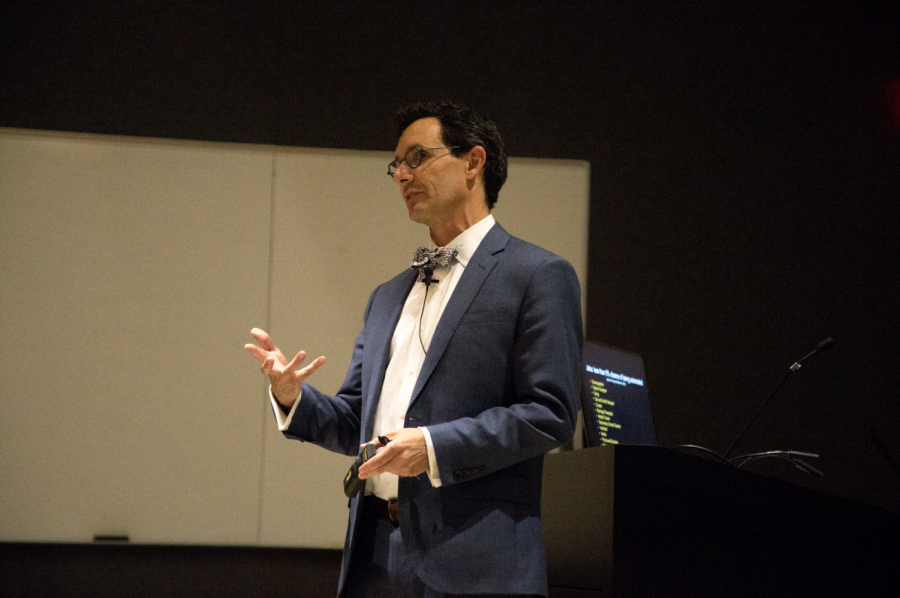Steven Tepper on how the arts are the secret to a happier society
Steven Tepper, dean of the Arizona State Herberger Institute for Design and the Arts, visited UI campus April 9 to deliver a lecture on how creativity and art can lessen the stress of rapid social change in today’s world.
Dean of the Herberger Institute for Design and the Arts at Arizona State University, Steven Tepper is seen on Tuesday, April 10th 2019. Steven Trepper gives a lecture on creativity, culture, and social change in the West Art Building.
April 10, 2019
In a digital, instant, and fast-paced world, change seems to happen overnight, with benefits as well as potential downsides.
“In times of rapid change, people do not want to be open to change,” said Steven Tepper, the dean of Arizona State Herberger Institute for Design and the Arts. “Three-fourths of Americans say that the world is changing too fast. Optimism has reached its historic low. Fewer than half of the people now believe that their children will have a better life than them.”
At 5:30 p.m. Tuesday, Tepper visited Art Building West to deliver a lecture in conjunction with the “Creative Matters” series and spoke regarding change and the role of creativity in tackling it.
“There are two responses to unrelenting and accelerating social change,” Tepper said. “The first is the one that’s natural, and part of our evolutionary survival, and that’s fear. The alternative is creativity.”
In regard to the two responses, Tepper said that rather than turn to a creative possible solution, today’s people often rely too much on scientific methods.
“We believe that we could use science, and technology, and economics, and rationality to solve everyone’s problems,” Tepper said. “We can just advance, make our communities wealthier, healthier, and we’re looking now and seeing things falling apart.”
Tepper implied that while scientific models are still important, they should be supplemented and executed with creative design in mind. A complete use of only the sciences to solve modern problems stunts the potential to involve the community with bureaucratic decisions that ultimately affect them.
“In this hubris of social sciences, we have stopped listening,” Tepper said. “We don’t see which experiences are most valuable and meaningful to our communities. Arts help us listen deeply, to observe, to not jump to conclusions because of data and formula.”
The “listening” involved in the arts simply cannot be replicated through scientific means at this point in technological development.
“There’s a lot of art and design jobs, and a lot of jobs that require significant human emotion and human touch,” Tepper said. “Those things will take a long time before we can create the AI to replicate that. Most people who study aesthetics do not believe that a computer will any time soon be able to replicate human creativity.”
Through series like “Creative Matters,” however, word is being spread on the importance of human creativity in the workforce today.
“The ‘Creative Matters’ lecture series was launched in 2015 in concert with the rebuilding of our arts campus,” Leslie Revaux, the manager of campus communications, said in an email to The Daily Iowan. “The series hosts events that we hope will spur campus- and community-wide discussions about how creativity is at the core of what all of us do, regardless of discipline.”
The series is taught by numerous creative geniuses nationwide, who are all willing to share their knowledge with the UI community.
“We bring in distinguished writers, artists, composers, and scientists to explore the creative process, what the poet Brewster Ghiselin called ‘the life of discovery,’ ” Christopher Merrill, the director of the International Writing Program, said in an email to the DI. “Ghiselin argued that ‘invention in the arts and in thought is a part of the invention of life.’ And this is what we hope to foster by inviting the most inventive people to campus.”
The striving for creative solutions is arguably crucial to the UI spirit, and it is likely that the “Creative Matters ” series will continue in the future.
“The focus for all the talks is creativity — what is it, how does it function in the speaker’s work, how can others tap into it,” Alan MacVey, the chair of the Arts Advancement Committee, said in an email to the DI. “We started the series with artists, then added scientists. Few institutions have so many creative people speaking regularly to the community. I’m happy that audiences have been inspired by them. I know Steven Tepper will keep up the reputation of the series.”



